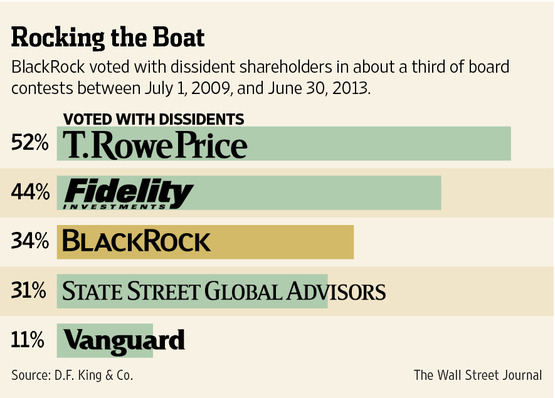|
THE WALL STREET
JOURNAL. |
MARKETS
|
Markets
BlackRock's
Fink Sounds the Alert
|
|
By
David Benoit and
Liz Hoffman
Updated March 25,
2014 6:45 p.m. ET
In a shot across the bow of activist investors,
BlackRock Inc. Chief Executive
Laurence Fink has privately
warned big companies that dividends and buybacks that activists favor
may create quick returns at the expense of long-term investment.
In so doing, the head of the world's largest money manager by assets
lent his voice to a popular criticism of activist investors, even as
his firm sometimes aligns with and may benefit from their efforts.
"Many commentators lament the short-term demands of the capital
markets," Mr. Fink wrote in the letter reviewed by The Wall Street
Journal, sent to the CEO of every S&P 500 company in recent days,
according to BlackRock. "We share those concerns, and believe it is
part of our collective role as actors in the global capital markets to
challenge that trend."
Mr. Fink doesn't specifically mention in his letter activist hedge
funds, which typically take stakes and push for corporate or financial
changes, from management ousters to buybacks, dividends and spinoffs.
Instead, he addresses a broader concern that markets and companies
generally have become too vulnerable to short-term thinking.
But the increasing clout of activists contributed to Mr. Fink's
decision to write the letter, people familiar with the matter said.
New York-based BlackRock itself votes about a third of the time with
dissident shareholders seeking corporate board representation,
according to data from D.F. King & Co., a proxy-solicitation firm.
Activists are attracting more assets and enjoying greater acceptance,
even as the debate continues over whether they are good for all
shareholders and, more broadly, economic growth.
Critics of activists contend that when companies use cash or new debt
to buy back shares or pay cash dividends to shareholders they are
forgoing the opportunities to invest in labor, production or other
potential avenues of future growth.
This month, Leo E. Strine Jr., chief justice of the Delaware Supreme
Court, argued that constant pressure from shareholders may distract
company executives and hurt returns. "Giving managers some breathing
space to do their primary job of developing and implementing
profitable business plans would seem to be of great value to most
ordinary investors," he wrote in the Columbia Law Review.
Activists, who move in and out of stocks more quickly than long-term
managers like BlackRock, have said their actions do more than cause
short-term pops.
By better focusing management, shedding low-performing businesses and
returning unused cash to investors, companies are on stronger footing
for the future, they said.
"The critique that activists are short-termed focus is a red herring
that typically comes from underperforming companies that have no
choice but to promise bluer skies in days to come," Jared L. Landaw,
chief operating officer of Barington Capital Group LP, said in an
email. His activist investing firm holds stakes three years, on
average, he said.
Unlike activists, BlackRock can't just sell out of most stocks, as
about 85% of its $2.3 trillion in equity assets are held in index
funds, which mirror collections of stocks. That long-term view drives
the firm's thinking, even when it supports activists, said Michelle
Edkins, BlackRock's head of corporate governance.
Activists themselves say a big driver of their success in recent years
has been the willingness of institutional investors to side with them.
Management has to pay more attention when its biggest shareholders
echo complaints that others raise.
Dissident shareholders who challenge management scored outright or
partial victories in about 60% of board fights in 2013, the highest on
record, according to FactSet, whose data go back to 2001.
Of the 30 fights that went all the way to a vote last year, activists
won 17.
"Institutional investors are looking at these situations much more on
a case-by-case basis" than in the past, said Richard Grossman, a
Skadden, Arps, Slate, Meagher & Flom LLP lawyer who represents
companies in activist fights. "That pendulum has swung, but it's swung
more to the middle."
In 50 board fights from July 2009 through June 2013 that
activist-nominated directors were up for election, BlackRock voted for
dissident nominees 34% of the time, according to D.F. King.
That compares with 11% for Vanguard Group, one of its largest peers.
But it is less than some other big investors, including
T. Rowe Price Group Inc. and
Fidelity Investments, which backed activists 52% and 44% of the time,
respectively.
These types of situations can arise over different views on a number
of issues, from buybacks to dividends to corporate breakups.
BlackRock voted for some dissident nominees of Jana Partners LLC in
that hedge-fund firm's fight to replace the board of
Agrium Inc. last year,
according to regulatory filings, a fight that Jana lost. It also
supported some of TPG-Axon Capital Management LP's nominees against
SandRidge Energy Inc., in
which TPG-Axon gained board seats.
BlackRock voted against
Carl Icahn in campaigns
against Forest Laboratories Inc. in 2011 and Oshkosh Corp. in 2012,
filings show. Mr. Icahn lost both those votes, though in later years
he gained board seats at Forest.
Ms. Edkins, BlackRock's head of corporate governance, said votes are
based on the quality of the nominees proposed by activists, which she
said have generally improved. She said activist campaigns still
represent a small minority of all situations in which BlackRock votes.
Write to
David Benoit at
david.benoit@wsj.com and Liz Hoffman at
liz.hoffman@wsj.com
|
